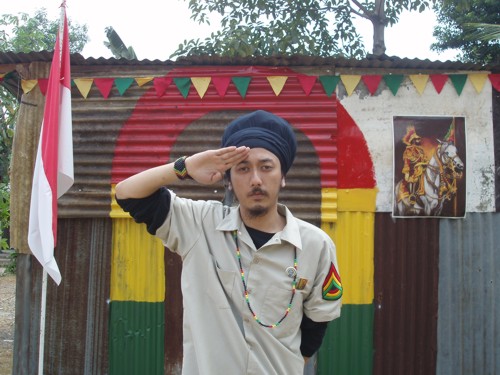
Now if ya love Reggae Music Say F O R W A R D D D D D D D D !!!!
This is Ras Muhammad, the hottest new Reggae Sensation From Indonesia
WE know many folks seem to believe that Reggae can only originate from Jamaica, but that's been proven to be old news. This is the News today children - Check out the Future of Reggae,
Moving's to the East (Ras Muhammad) - Leaving Babylon
Asianrockers with a Full African Flava.
Nuff RASPECT Ras Muhamad - Hold Up HIM Bloodstained Truth, EVER

Indonesian reggae singer Ras Muhamad performs his songs and talks politics
By Claire Bolderson BBC World Service, Jakarta |
One such voice is Ras Muhamad, a young reggae singer.
He was chosen by Rolling Stone magazine Indonesia as Best New Reggae Artist in 2008.
The same year his song Musik Reggae Ini (This Reggae Music) was nominated for an AMI Award - Indonesia's answer to the Grammys.
His songs are about money, corruption and political leadership.
Ahead of July's presidential election, and following April's parliamentary poll, his subject matter resonates with his young and excitable audience.
Ras Muhamad |
"A lot of politicians here only reach out to people when it's election time and when election time is over they just disappear and then we don't hear about them any more," he tells me.
Instead he believes people have to help themselves: "You can shape your own destiny by your struggle, by your works and bring about a lot of changes."
Ras has certainly shaped his own destiny.
He was born in Indonesia's capital Jakarta, but moved with his parents to US in the early 1990s before returning home four years ago.
He first began performing reggae as a teenager living in the Queens borough of New York, and while still in high school formed his first band.
He describes his type of reggae as "dancehall" reggae - a style that combines reggae and hip-hop.
 |
But his idols are still Bob Marley and Peter Tosh, performers who were unafraid to let politics influence their music.
He says he chose reggae because it suits his voice and style, but also because it can convey a message too.
"Reggae music is always the voice of the people. Whatever is happening, I feel like I have to sing about it," he explains.
"The basis and foundation of reggae is always about unity, and one of the role models in reggae is [former Ethiopian Emperor] Haile Selassie and I always look up to him and also the first president of Indonesia, Sukarno."
Sukarno declared Indonesia's independence from colonial rule and became a leading figure of the Non Aligned Movement.
New generation
So does Ras see himself with a future in politics?
"I never think of myself as a political musician, but the society we are living in in Indonesia, we have a lot of conflicts," he says.
"That's why I want to convey that we have to care for each other and also respect each other, not just slogans and that type of thing."
Ras Muhamad |
His song Crisis decries the lack of care and love in society, and calls for the gap between the rich and the poor to be narrowed.
More than half Indonesia's work force earn less than $2 a day while a tiny but visible elite at the top are multi-millionaires.
"It seems like the richest of the rich, they just look after themselves and they never reach out to the poor, they never help the underprivileged," he says.
He says however that the onus is on both groups to try to change things.
"The rich can't stay by themselves they have to reach out, and the poor, they can't just say, 'I'm poor, ok and well that's it, can't do anything about it', you know."
He hopes that his music will reach out to a new generation of leaders in both politics and civil society who have the potential to change Indonesia and make it a fairer, more open society.
"I hope they can be a stronger generation and don't depend too much on political leaders," he says.
1 comment:
More about Ras Muhammed at www.rasmuhammed.com
Post a Comment